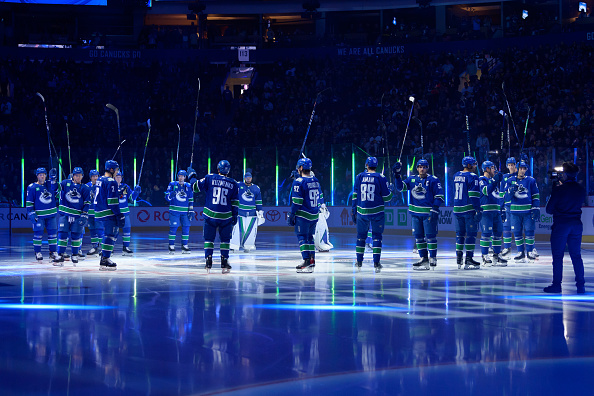The funny thing about losing streaks is that they happen. The funnier thing is that we keep acting like they don’t and are surprised anew when they happen again.
On NHL Early-Season Losing Streaks
Of Winning Streaks and Wish Fulfillment
NHL losing streaks – and winning streaks – are longer since the league eliminated ties in 2005-06, and that just amplifies them. Quite a lot has been made about bad starts to the season – in this case with the Vancouver Canucks – and how much that start means. They provide a stark example, so we’ll stick with them.
Last season, 2021-22, the Canucks started horrendously: eight wins in 25 games. For a group in a perpetual state of Almost, that’s a clear and resounding Nope. So the upheaval among the White Collar crowd and the change behind the bench et voila!* Whole new season sprung to life!
It’s not that simple of course, because nothing is, but it was a massive change. And there is no doubt that the change was very effective. There was an immediate winning streak that got the team cup to “NHL .500” which was nice. The Canucks briefly even made it to actual .500 when they had 38 wins in 76 games but that’s as high as they got.
The rallying cry quickly became “What if we changed coaches sooner?” The logic is easy to see, filtered though it is through wishful thinking. Get rid of that nine-game streak where the team only got two points and they’re playoff bound! There is, alas, a problem with that math as those nine games need to be replaced with something.
Cherry-Picking Orchards
If teams got to choose which ten-game run they’d eliminate from the standings, the end of the year would be a lot more interesting. For math nerds, anyway. So actually not that much more interesting. Back to the point.
The current NHL season is 82 games for a reason: money. But also for another reason, and that’s averaging out the bounces. In the NFL’s limited schedule (17 games), each game is extremely important because of how few there are. In baseball, the difference between the regular season (162 games) and the playoffs (seven-game series) is frankly legendary. Regular season baseball is, to steal from the best, pastoral.
The more games that are played, the less chance luck plays a big part in the standings. And in hockey, luck matters a LOT on any given play. The ice gets gradually worse as the play goes on. A flipped puck bouncing on the ice will go in completely unpredictable tangents. Something as goofy as someone’s skate blade coming off at a bad moment can completely change the final score. Get bad luck at the worst moments and you have yourself a losing streak.
The same thing happens with refereeing – those bad calls against your team are generally evened out by the ones for it come year’s end. You’re not as likely to notice because most of us ignore it when the breaks go our way. That’s just Human Nature 101 and welcome to it. The reason why seasons are as long as they are (money) is so the odds will, well, even. There are three NHL losing streaks as of this writing sitting at four games – the Pittsburgh Penguins, St. Louis Blues, and Toronto Maple Leafs. As far as we know, nobody thinks those are the worst teams in the league.
Doom! DOOM!
You’ve undoubtedly seen some projections that show after a certain point the NHL playoff teams are pretty much set. Only one or two teams in each conference can change their fortunes enough to get above the line if they are below it on US Thanksgiving! Might as well pack up the jerseys and wait for next year. Sorry!
Which, okay sure, if you only like a sport when your team is winning, that’s fine. No, really that is completely fine. It’s entertainment for people to enjoy, and however you want to enjoy it is entirely up to you. Hitting the highs while avoiding each inevitable losing streak is often derided as being a “fair-weather fan” of course. But if you really hate rainy days, it makes sense not to go walking around on them.
What you will miss out on is the fun perversity that comes with backing a loser. Since sports aren’t actually all that important in the real world, you can commit to them wholeheartedly. It’s a very low-risk, low-stakes passion, like watching a horror movie or a particularly turgid soap opera. As one Hockey Hall of Famer put it:
best thing about sports is nobody is ever having fun…. yet we watch everyday
— Tony X (@soIoucity) October 29, 2022
But Hope
Back to the serious part of the article, then. There is a whole lot of hand-wringing about the Vancouver Canucks slow start to the season. They were the last team to record a win, finally getting it on their eighth try. Canucks Twitter, primed as it is through decades of backing a losing team, had a rousing chorus of “Bottom Out For Bedard!” It’s been pointed out that the team will now need to win around 43 of their remaining games to make the playoffs.
That seems hard, so better to quit in October, trade everyone away, and… uh… That’s usually where the conversation ends because not a whole lot of thought goes into it. Low stakes, remember? Another thought does eventually percolate through, and that one’s something along the lines of “If only we could get rid of those games!” Which is just as silly as getting rid of the 25 that started the 2021-22 season. It’s not as if streaks don’t go both ways, either. Yes, NHL losing streaks are more common since 2005-06, but so are winning streaks – and for the exact same reason.
The Florida Panthers had a seven-game streak in which they won just two games. They finished the 2021-22 season with 122 points and the President’s Trophy. The Colorado Avalanche had a 1-5-1 stretch last year and they won the Stanley Cup. The 115-point Carolina Hurricanes had the same 1-5-1 span. And, of course, the Toronto Maple Leafs started last season going 2-4-1. Those aren’t technically “losing streaks” but it’s close enough for hockey.
What it All Means
The big reason why teams are apparently set – more or less – come Thanksgiving is that most of the breaks are evening out. Good teams are better than bad ones and 20-ish games are enough to start separating them. But because streaks happen, twenty games isn’t quite enough to trigger the Law of Large Numbers. The teams that are in a playoff spot are more likely to stay there, but no guarantees.
If your team is stumbling through a slow start, just remember that the very best teams had NHL losing streaks last season. For your guys, that run just happens to be at the beginning of the season instead of the middle. Relax – it’ll even out eventually. It could also mean that your team just sucks this year. Might be a good time to work on enjoying the sport instead of the team.
Or – if you discover that the drama is your thing – we’re pretty sure hair shirts come in Canucks colours. Maybe in reverse retro, if you’re lucky!
*French for “Bruce, There It Is.”
Main Photo:
Embed from Getty Images






